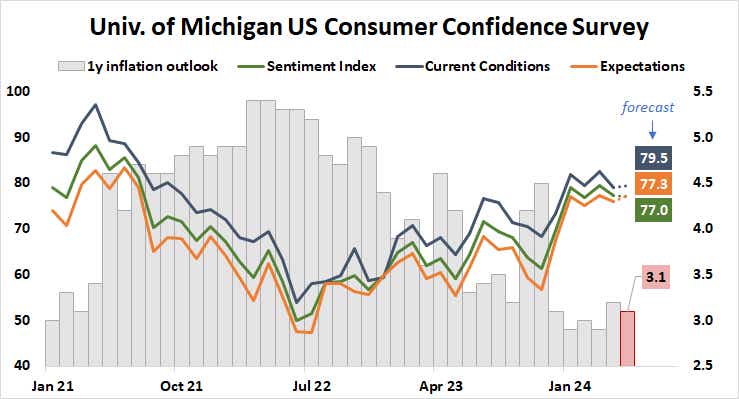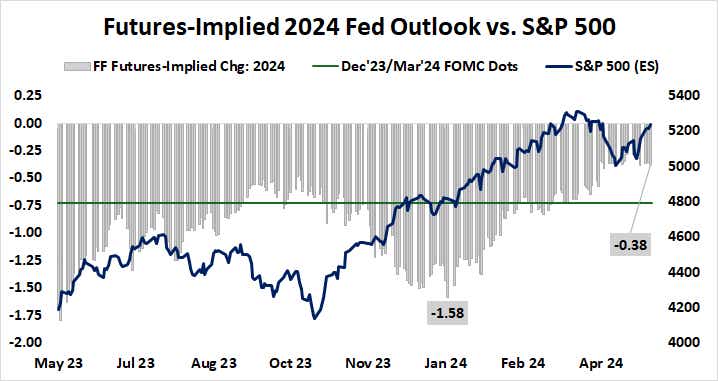Stocks May Fall if U.S. Consumer Confidence Data Cools Fed Rate Cut Bets

Stocks May Fall if U.S. Consumer Confidence Data Cools Fed Rate Cut Bets
By:Ilya Spivak
Stock at risk if U.S. consumer confidence data shows inflation fears are building once again
Wall Street cheered as jobless claims uptick stokes Fed rate cut hopes.
University of Michigan U.S. consumer confidence survey now in focus.
Stocks may fall if consumers’ inflation outlook is hotter than expected.
Stock markets continue to celebrate signs that the U.S. economy is shifting into a slower gear.
The bellwether S&P 500 sailed higher after the weekly jobless claims report showed more people filed for unemployment benefits than analysts expected. Initial claims came to 231,000. That topped the median forecast of 210,000 and set a nine-month high.
Echoing their response to last week’s soggy April payrolls data, the markets seem to have reckoned that the claims report improved prospects for Federal Reserve interest rate cuts. The policy-sensitive two-year Treasury bond yield tellingly fell as the numbers came across the wires.
Markets set sights on U.S. consumer confidence data
The next round of U.S. economic news may not be as friendly for Wall Street. The University of Michigan (UofM) is set to publish the May edition of its closely watched survey of U.S. consumer confidence. It is expected to show that sentiment held steady near the three-year high set in February.

Consumers’ disposition has been steadily improving for nearly two years having set a pessimism peak in June 2022. Tellingly, that came the very next month after the survey’s own measure of respondents’ one-year inflation expectations peaked above 5% in May. As price growth fears have cooled thereafter, overall optimism has built.
The critical question now facing investors is whether April’s survey pool participants noticed that progress has stalled recently.
Last month’s data flow was particularly spicy. Indexes of consumer (CPI) and producer (PPI) prices, the inflation component of first-quarter gross domestic product (GDP) data, and the Fed’s favored personal consumption expenditure (PCE) costs gauge all registered faster growth than market-watchers expected.
Stocks at risk if consumers see inflation fears return
A separate study from the University of Michigan published earlier this month looked at how survey respondents come to their conclusions about inflation. “Personal experiences” ranked relatively low, while “mainstream” and “general” news outlets dominated. This suggests that headlines about price growth topping forecasts are being seen.

For now, the markets are primed for a relatively mild reading of 3.1% on the one-year inflation expectations gauge in May’s UofM report. That would land comfortably within the 2.9% to 3.2% range carved out since the beginning of the year. An unexpected pop higher might serve as a glaring reminder that the Fed has turned skittish about rate cuts.
The markets’ sensitivity to anything that might nudge policy bets one way, or another means that even a slight push to a more hawkish setting on the priced-in outlook following such data threatens Wall Street.
As it stands, fed funds futures reflect 38 basis points (bps) in stimulus this year. That’s one 25 bps cut and a 52% probability of a second one.
Ilya Spivak, tastylive head of global macro, has 15 years of experience in trading strategy, and he specializes in identifying thematic moves in currencies, commodities, interest rates and equities. He hosts Macro Money and co-hosts Overtime, Monday-Thursday. @Ilyaspivak
For live daily programming, market news and commentary, visit tastylive or the YouTube channels tastylive (for options traders), and tastyliveTrending for stocks, futures, forex & macro.
Trade with a better broker, open a tastytrade account today. tastylive, Inc. and tastytrade, Inc. are separate but affiliated companies.
Options involve risk and are not suitable for all investors. Please read Characteristics and Risks of Standardized Options before deciding to invest in options.
tastylive content is created, produced, and provided solely by tastylive, Inc. (“tastylive”) and is for informational and educational purposes only. It is not, nor is it intended to be, trading or investment advice or a recommendation that any security, futures contract, digital asset, other product, transaction, or investment strategy is suitable for any person. Trading securities, futures products, and digital assets involve risk and may result in a loss greater than the original amount invested. tastylive, through its content, financial programming or otherwise, does not provide investment or financial advice or make investment recommendations. Investment information provided may not be appropriate for all investors and is provided without respect to individual investor financial sophistication, financial situation, investing time horizon or risk tolerance. tastylive is not in the business of transacting securities trades, nor does it direct client commodity accounts or give commodity trading advice tailored to any particular client’s situation or investment objectives. Supporting documentation for any claims (including claims made on behalf of options programs), comparisons, statistics, or other technical data, if applicable, will be supplied upon request. tastylive is not a licensed financial adviser, registered investment adviser, or a registered broker-dealer. Options, futures, and futures options are not suitable for all investors. Prior to trading securities, options, futures, or futures options, please read the applicable risk disclosures, including, but not limited to, the Characteristics and Risks of Standardized Options Disclosure and the Futures and Exchange-Traded Options Risk Disclosure found on tastytrade.com/disclosures.
tastytrade, Inc. ("tastytrade”) is a registered broker-dealer and member of FINRA, NFA, and SIPC. tastytrade was previously known as tastyworks, Inc. (“tastyworks”). tastytrade offers self-directed brokerage accounts to its customers. tastytrade does not give financial or trading advice, nor does it make investment recommendations. You alone are responsible for making your investment and trading decisions and for evaluating the merits and risks associated with the use of tastytrade’s systems, services or products. tastytrade is a wholly-owned subsidiary of tastylive, Inc.
tastytrade has entered into a Marketing Agreement with tastylive (“Marketing Agent”) whereby tastytrade pays compensation to Marketing Agent to recommend tastytrade’s brokerage services. The existence of this Marketing Agreement should not be deemed as an endorsement or recommendation of Marketing Agent by tastytrade. tastytrade and Marketing Agent are separate entities with their own products and services. tastylive is the parent company of tastytrade.
tastyfx, LLC (“tastyfx”) is a Commodity Futures Trading Commission (“CFTC”) registered Retail Foreign Exchange Dealer (RFED) and Introducing Broker (IB) and Forex Dealer Member (FDM) of the National Futures Association (“NFA”) (NFA ID 0509630). Leveraged trading in foreign currency or off-exchange products on margin carries significant risk and may not be suitable for all investors. We advise you to carefully consider whether trading is appropriate for you based on your personal circumstances as you may lose more than you invest.
tastycrypto is provided solely by tasty Software Solutions, LLC. tasty Software Solutions, LLC is a separate but affiliate company of tastylive, Inc. Neither tastylive nor any of its affiliates are responsible for the products or services provided by tasty Software Solutions, LLC. Cryptocurrency trading is not suitable for all investors due to the number of risks involved. The value of any cryptocurrency, including digital assets pegged to fiat currency, commodities, or any other asset, may go to zero.
© copyright 2013 - 2025 tastylive, Inc. All Rights Reserved. Applicable portions of the Terms of Use on tastylive.com apply. Reproduction, adaptation, distribution, public display, exhibition for profit, or storage in any electronic storage media in whole or in part is prohibited under penalty of law, provided that you may download tastylive’s podcasts as necessary to view for personal use. tastylive was previously known as tastytrade, Inc. tastylive is a trademark/servicemark owned by tastylive, Inc.